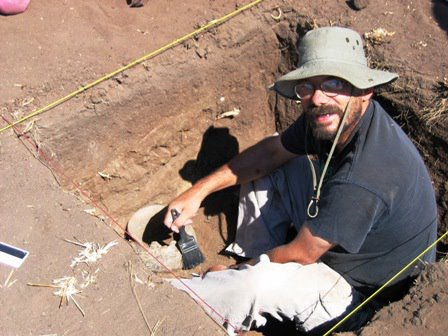Both Abnormal Interests and Afarensis picked up on my previous posts regarding Richard Colling and I notice that Professor Colling also left a message at Chris Heard's blog, Higgaion. (By the way - I noticed that every comment, email, etc. written by Rick Colling and posted online somewhere was mostly original in content. In other words, he is not simply "cutting and pasting" the same message at numerous locations to get the word out. I think there can be no criticism of Professor Colling's professional integrity - he just wants to continue to educate students in the best science possible; a science, furthermore, that Colling has personally found supportive of his faith).
Afarensis draws an important anthropological consideration regarding all the furor over Colling teaching evolution at an evangelical university. Afarensis writes:
In essence, those "...few profoundly scientifically ignorant individuals..." have decided that Dr. Colling is no longer christian enough to teach biology at the university. This is a good example of why framing won't work. Dr. Colling comes across as an intelligent individual with a sophisticated grasp of christian theology, yet he has run afoul of fundamentalist members of his community.
I am afraid I have not kept up with all the commentary on "framing" going through the science blogs of late, so I cannot really comment on whether this incident runs counter to the idea of framing. However, I fully agree with Afarensis' assertion that this is an example of groups maintaining their cultural boundaries:
It all gets back to boundary maintenance (a mechanism to prevent ideas from eeping across porous cultural boundaries - in effect boundary maintenance mechanisms serve to separate culture groups and provide a rigid, well defined marker between "us" and "them") and Dr. Colling strayed too far across the boundary. For his local community Dr. Colling has become one of "them".
Afarensis cites Peter Berger and Thomas Luckmann's book, The Social Construction of Reality: A Treatise in the Sociology of Knowledge. Again, I have not read the book, but the idea of a sort of "cultural immune system" is talked about with some frequency in anthropological circles. I would argue from my own currently limited understanding of boundary maintenance in anthropological theory (including its archaeological applications) that political motivations are often underwritten (or masked) by other aspects of culture, including religion. I can easily see much of the creationist movement (particularly "intelligent design") being fueled more by political and economic considerations than by sincere belief. As an example, I sometimes wonder if Ken Ham's creationist position has more to do with the ability to talk donors out of $28 million dollars for a museum (plus, no doubt, a healthy lifestyle for himself) than a sincere commitment to the idea that the earth is only 6,000 years old and tyrannosaurs were vegetarians prior to The Fall. Ken Ham, Rick Warren, Bill Donahue and others have far more to lose (in terms of economic and political power) than a scientific argument. And I find it interesting that those opposed to Rick Colling seem to be wielding financial threats (read: economic power) in a way that is more suggestive of a concern to maintain a cultural boundary where they are in control on one side. Put another way, I am very suspicious of those with power (economic or political) espousing religious or other cultural "values" - one has to constantly wonder whether they do it out of a sincere belief, or simply to maintain their economic "base".
I've rambled here, but I think Afarensis has hit on an idea that deserves further reflection and comment.
Subscribe to:
Post Comments (Atom)




1 comment:
I think The Sacred Canopy also by Berger would also be good. In passing, none of the stuff I have read relating to religion and boundary maintenance mentions politics or economics (being more focussed on how believers separate themselves from the rest of the world - according to Berger this goes hand in hand with theodicy), so I will have to think about that for awhile...
Post a Comment